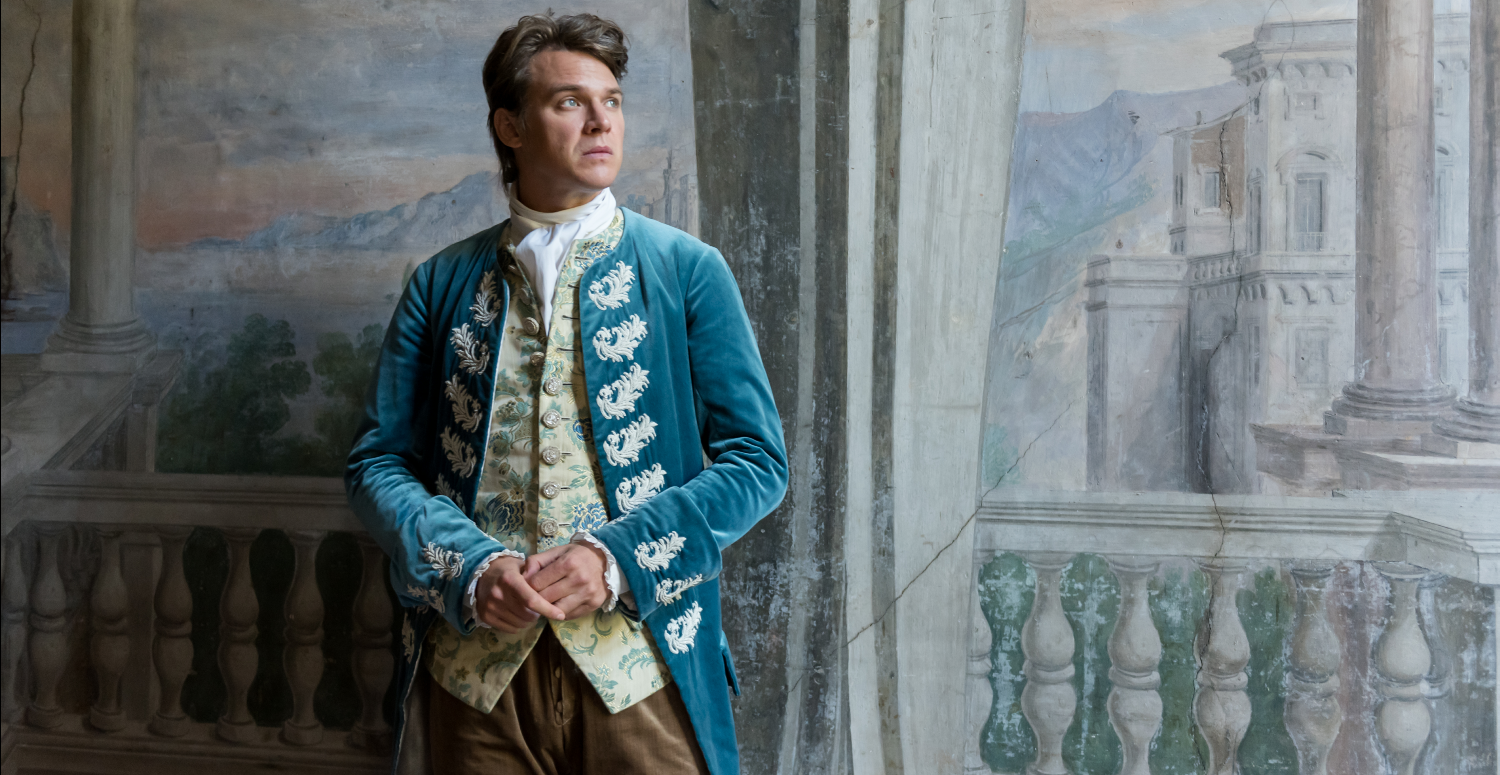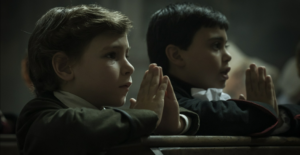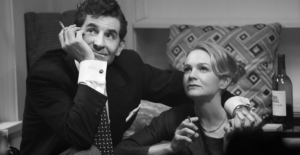Il Boemo
2022/2023

FR EN
Mozart l’admirait, l’Histoire l’a oublié ! Telle est l’histoire du musicien et compositeur Josef Mysliveček, dit il boemo.
Bohème, il l’est en effet à la fois par ses origines pragoises mais aussi par son mode de vie plongé dans une cité vénitienne libertine dans les années 1770. Malgré tout son talent, il ne parvient pas à percer les cercles lyriques de noblesse. Mais il sait séduire et travailler dur, et parvient ainsi à faire exister ses opéras grâce aux femmes qui croisèrent sa route. Déjà auteur d’un documentaire sur lui (Confession d’un disparu), le cinéaste tchèque et parisien Petr Václav propose cette fois la version fiction avec un biopic particulièrement documenté sur les coulisses et les représentations de l’époque rendant justice aux personnages féminins dans le succès que l’Histoire ne retient que comme celui d’un seul homme.
Ce film italo-tchèque multilingue (cinq langues parlées) est porté par l’interprétation de Vojtěch Dyk aux côtés d’un casting accompagné par des solistes internationaux tels que Simona Šaturová, Raffaella Milanesi ou encore Philippe Jaroussky sous la direction du chef Václav Luks et de son orchestre. Un film historique, musical et choral sur l’un des compositeurs vedettes du XVIIIe dont il ne nous reste des écrits de Mozart qui lui voua une amitié indéfectible allant jusqu’à lui ‘emprunter’ l’ouverture d’un opéra pour son Mitridate.
Mozart l’admirait, l’Histoire l’a oublié ! La promotion est accrocheuse, le film est bien meilleur !
Entre la Belle aristocrate qui apprend au compositeur d’aimer aussi ceux qui l’aiment, elle, parce que ce sont eux qui lui passeront des commandes, et le compositeur Josef Mysliveček, qui apprend à la Prima Dona de l’époque, la Gabrielli, de savoir conjuguer avec sa musique son immense talent de cantatrice, trois scènes de ce film magnifique « Il Boemo » montrent avec force et justesse les difficultés récurrentes et souvent révoltantes pour les artistes de vivre de leur art.
En ces années 1770, en Italie avec ses royaumes et principautés de mécènes peu amènes, comme dans toute l’Europe, le film de Petr Václav et son casting d’acteurs et d’actrices, tous remarquables autour de Vojtěch Dyk, rappelle que la musique n’est ni totalement indépendante de son époque ni vouée aux concessions qui lui seraient imposées, comme le résument les stéréotypes artistiques d’aujourd’hui. Comme le rappelle le réalisateur, elle n’est pas affaire de compromis mais “d’études, d’échanges, d’entraides, d’emprunts” et de traductions originales des artistes.
Ce film en narre les agapes libertines et les joutes de pouvoirs, les récits de rencontres amoureuses, les compositions musicales et les arias des cantatrices intégrés avec une maestria qui rappelle le film « Amadeus » plus policé et hollywoodien de son compatriote Miloš Forman, et l’implacable parvenu dans la Guerre de sept ans de Stanley Kubrick « Barry Lindon ». Rares sont les réalisateurs qui peuvent se targuer de telles références.
Après la Querelle des Bouffons, dans le Paris de 1750, entre J.J. Rousseau le critique autodidacte et J.B. Rameau le musicien érudit, et avant que le jeune Wolfgang Amadeus Mozart ne reprenne une ouverture du compositeur tchèque dans un de ses premiers opéras, « Il Boemo », le compositeur comme le film savent jouer de l’harmonie et de ses contrepoints avec une rare justesse. Après les arias de l’Opera seria, mythologie pour aristocrates repus, incultes et sclérosés, qui prétendent ‘se payer’ leurs artistes dans leur pot de chambre, le compositeur annonce à sa diva que sa voix magnifique peut enchanter aussi le nouvel Opera Buffa et les événements comiques ou sentimentaux de la vie de tous les jours, que les bourgeois et nouveaux publics commencent à apprécier.
Le film et le cinéma de Petr Václav sont aussi beaux qu’implacables, aussi érudits que lyriques pour faire vivre de la musique ce qu’elle nous révèle du monde quand ils changent. Les panoramas de beauté, les huis clos d’amour et de brutalité et les virtuosités musicales, enchaînent prouesses d’acteurs, scénario et scènes d’opéra, comme une œuvre de concert qui devrait faire date pour que, à l‘instar de Mozart, l’Histoire ne l’oublie pas.
Christian Sallenave
{English below, Česky níže & Italiano alla fine}
Mozart admired him, History forgot him! Such is the story of musician and composer Josef Mysliveček, aka il boemo.
Bohemian, he was, indeed, both by his Prague origins and by his lifestyle, living in a libertine Venetian city in the 1770s. Despite all his talent, he failed to find his way into the lyrical circles of the nobility. But he knew how to charm and work hard, allowing his operas to exist thanks to the women who crossed his path. After a documentary about him (Zpověd’ zapomenutého), Czech and Parisian filmmaker Petr Václav now brings us the fictional version, with a particularly well-documented behind-the-scenes biopic that pays tribute to the female characters in a success that history records as the legacy of a single man.
This multilingual (five languages spoken) Czech-Italian film features Vojtěch Dyk alongside a cast of international vocal soloists including Simona Šaturová, Raffaella Milanesi and Philippe Jaroussky, under the direction of conductor Václav Luks with his Orchestra. A historical, musical and choral movie about one of the leading composers of the 18th century, of whom only writings remain from Mozart, who devoted an unwavering friendship to him, going so far as to ‘borrow’ him the overture to an opera for his Mitridate.
ČEŠTINA
Zbožňován Mozartem, zapomenut historií! Takový je příběh hudebníka a skladatele Josefa Myslivečka, známého jako il boemo.
Bohémem byl kvůli pražskému původu i kvůli svému životnímu stylu v libertinských Benátkách v 70. letech 17. století. Přes veškerý talent se mu nepodařilo proniknout do vysoké společnosti. Avšak tvrdě pracoval, dokázal okouzlit a své opery zrealizoval i díky ženám, které mu zkřížily cestu. Česko-pařížský filmař Petr Václav už o něm natočil dokumentární film Zpověď zapomenutého, nyní přichází z fiktivní verzí. Obzvlášť dobře pracuje s kulisami a vykreslením tehdejší doby. Vzdává hold ženským postavám, na které historie nepamatuje – jejich snaha se rozplynula v úspěchu jediného muže.
Ve vícejazyčném česko-italském filmu (zazní v něm až pět řečí) hraje prim Vojtěch Dyk. Herce doplňují mezinárodní sólisté jako Simona Šaturová, Raffaella Milanesi a Philippe Jaroussky pod vedením dirigenta Václava Lukse a jeho orchestru. Historický film s hudební tematikou pojednává o předním skladateli 18. století, po kterém zůstaly jen Mozartovy spisy. Ten byl jeho nerozlučným přítelem a dokonce mu “propůjčil” ouverturu k opeře Mitridate.
Raphaël Sallenave
(Přeložila A.B.)
ITALIANO
Mozart l’ammirava, la Storia l’ha dimenticato! Questa è la storia del musicista e compositore Josef Mysliveček, detto il (divino) Boemo.
Doppio soprannome per colui che ha origini praghesi (boemo) nonché uno stile di vita nel cuore della città veneziana libertina degli anni 1770 (bohème). Nonostante il suo talento, non riesce ad entrare nei circoli lirici della nobiltà. Ma sa sedurre e lavorare sodo, e così riesce a dare vita alle sue opere grazie alle donne che incrociano sul suo cammino. Dopo aver già realizzato un documentario su di lui (Zpověd’ zapomenutého, cioè Confessione di uno sparito), il regista ceco e parigino Petr Václav ne propone qui una versione romanzata con un biopic particolarmente documentato sui retroscena e le rappresentazioni dell’epoca, rendendo giustizia ai personaggi femminili di un successo che la Storia registra come solo quello di un uomo.
Questo film italo-ceco multilingue (cinque lingue parlate) è portato avanti dall’interpretazione di Vojtěch Dyk insieme ad un cast accompagnato da solisti internazionali come Simona Šaturová, Raffaella Milanesi oppure Philippe Jaroussky, sotto la direzione del direttore d’orchestra Václav Luks e dei suoi musicisti. Un film storico, musicale e corale su uno dei compositori celeberrimi del Settecento di cui rimangono solo gli scritti di Mozart, quest’ultimo che gli fu un amico fedele ed infaticabile – fino a gli “prendere in prestito” l’ouverture di un’opera per il suo Mitridate.
Raphaël Sallenave
(Tradotto da A.C.)
BIS
ENGLISH
Mozart admired him, History forgot him! The tagline is good, and the film is even better!
Between the beautiful noblewoman who teaches the composer to also love those who love her, because they are the ones who will commission him, and the composer Josef Mysliveček, who teaches the Prima Dona of the time, Gabrielli, to know how to couple her immense talent as a singer with her music, here are three scenes from this wonderful movie « Il Boemo » that powerfully and accurately show the recurring and often revolting hardships artists face in making a living from their art.
In the 1770s, in Italy with its kingdoms and principalities of unfriendly patrons, as throughout Europe, Petr Václav’s film and its remarkable cast of actors and actresses around Vojtěch Dyk, reminds us that music is neither totally independent of its time nor doomed to the concessions imposed on it, as today’s art stereotypes might suggest. As the director points out, it’s not a matter of compromise, but of « study, exchange, mutual cooperation, borrowing » and original interpretation by artists.
This film narrates the libertine feasts and jousts for power, the tales of love encounters, the musical compositions and arias of the female singers featured with a masterful sense reminiscent of his compatriot Miloš Forman’s more polished, Hollywood-style « Amadeus », and Stanley Kubrick’s remorseless « Barry Lindon » in the Seven Years’ War. Few directors can boast such credentials.
After the Querelle des Bouffons, in the Paris of 1750, between J.J. Rousseau the self-taught critic and J.B. Rameau the erudite musician, and before the young Wolfgang Amadeus Mozart used an overture from the Czech composer in one of his first operas, « Il Boemo », both the composer and the film know how to play with harmony and counterpoint with rare finesse. After the arias of the Opera seria, a mythology for stuffy, uncultured and sclerotic aristocrats who claim to get their artists in their chamber pot, the composer tells his diva that her majestic voice can also enchant the new Opera Buffa and the comic or sentimental events of everyday life, which the bourgeois and new audiences are beginning to relish.
Petr Václav’s film and cinema are as beautiful as they are compelling, as erudite as they are lyrical, bringing to life through music what it reveals to us about the world as it changes. The panoramas of beauty, the intimate scenes of love and brutality and the musical virtuosity, combine acting prowess, script and opera scenes, like a symphony that should make history so that, like Mozart, it won’t be forgotten.
Chrisitan Sallenave
(Translated by R.S.)

